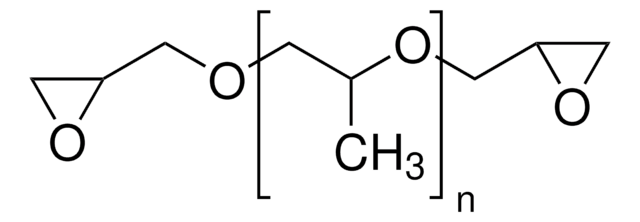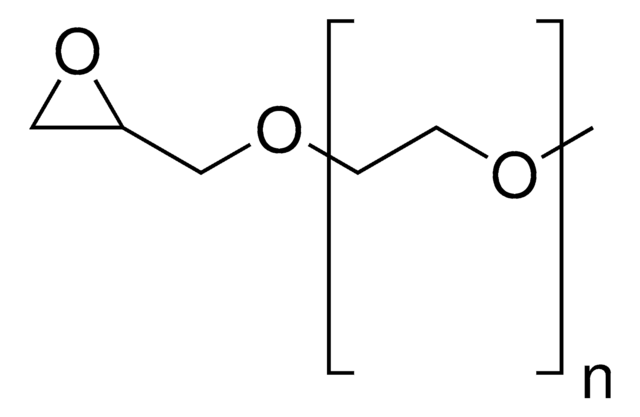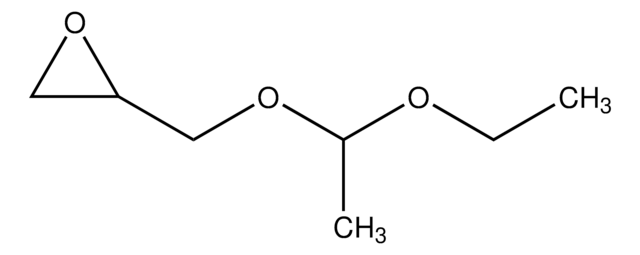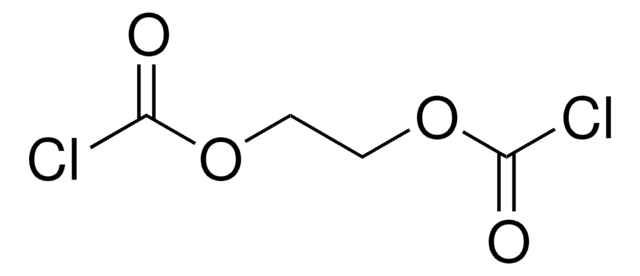731811
Poly(ethylene glycol) diglycidyl ether
average MN 2,000, cross-linking reagent amine reactive
Synonyme(s) :
Polyethylene glycol, Diepoxy PEG, PEG diglycidyl ether, Polyoxyethylene bis(glycidyl ether)
About This Item
Produits recommandés
Nom du produit
Poly(ethylene glycol) diglycidyl ether, average Mn 2,000
Forme
liquid
Niveau de qualité
Poids mol.
average Mn 2,000
Pertinence de la réaction
reagent type: cross-linking reagent
reactivity: amine reactive
Pf
49-54 °C
Architecture des polymères
shape: linear
functionality: homobifunctional
Température de stockage
2-8°C
Chaîne SMILES
O1C(C1)COCCOCC2OC2
InChI
1S/C8H14O4/c1(9-3-7-5-11-7)2-10-4-8-6-12-8/h7-8H,1-6H2
Clé InChI
AOBIOSPNXBMOAT-UHFFFAOYSA-N
Vous recherchez des produits similaires ? Visite Guide de comparaison des produits
Application
- Impact of Poly(ethylene glycol) Diglycidyl Ether on PVC/PEO Blend Properties: This study examines the influence of PEGDE on the tensile properties, morphology, and electrical conductivity of PVC/PEO blends, highlighting its effectiveness as a surface modifier (Supri et al., 2016).
- Flexible Wearable Sensors Based on CNTs and PEGDGE: This research focuses on developing flexible wearable sensors by reinforcing carbon nanotubes with PEGDGE, analyzing their strain sensitivity and mechanical properties (Del Bosque et al., 2021).
- Network Polymers via Addition Reactions of Multifunctional-Amine and PEGDGE: The synthesis of network polymers through the reaction of multifunctional-amine and PEGDGE or diacrylate compounds, exploring their application in materials science (Naga et al., 2020).
- Modification of Alkali Lignin with PEGDGE for Bio-lubricant Applications: This study modifies alkali lignin with PEGDGE to enhance its use as a thickener in bio-lubricant formulations, demonstrating improved dispersion and stability (Cortés-Triviño et al., 2018).
- Characterization of Injectable Hyaluronic Acid Dermal Fillers Cross-Linked with PEGDGE: Investigates hyaluronic acid dermal fillers cross-linked with PEGDGE, focusing on their physicochemical properties and applications in aesthetic medicine (Zerbinati et al., 2021).
Code de la classe de stockage
12 - Non Combustible Liquids
Classe de danger pour l'eau (WGK)
WGK 3
Faites votre choix parmi les versions les plus récentes :
Déjà en possession de ce produit ?
Retrouvez la documentation relative aux produits que vous avez récemment achetés dans la Bibliothèque de documents.
Les clients ont également consulté
Articles
Highlighting new synthetic modifications of PEG to improve the mechanical properties and degradation of resulting hydrogels in tissue engineering applications.
Highlighting existing and novel fabrication methods for both, solid and hydrogel-based scaffold for tissue engineering applications.
Notre équipe de scientifiques dispose d'une expérience dans tous les secteurs de la recherche, notamment en sciences de la vie, science des matériaux, synthèse chimique, chromatographie, analyse et dans de nombreux autres domaines..
Contacter notre Service technique










